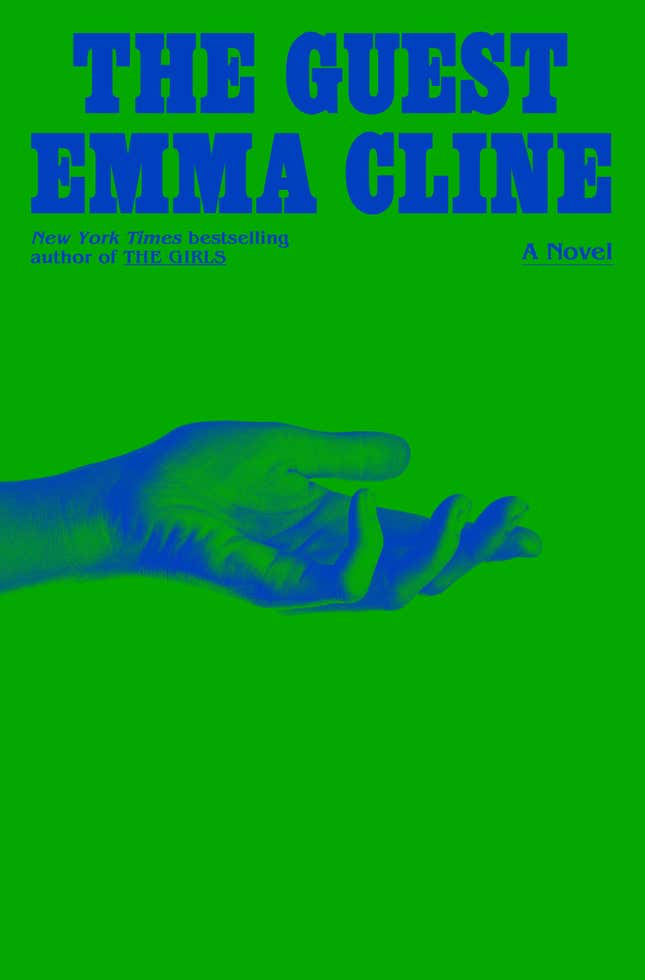
Even if you didn’t care for the fruits of Amy Chozick’s labor, there’s a charitable reading to be made of her attempt to get under the skin of Elizabeth “Liz” Holmes in a recent New York Times profile of the convicted fraudster. Firstly, there’s the readership’s appetite to consider. We love, hate, love to hate, and hate to love scammers. They are as defining to this pop culture era as reboots, sung rap music, and Baccarat Rouge 540. So you can see how Chozick’s stated dilemma—“How do you have an honest conversation with a person whose fraud trial has played out so publicly?”—was a tantalizing challenge. It’s just too bad that her conclusions were pat and ultimately exposed the notion of an honest conversation with Holmes as a fool’s errand, which is what virtually anyone who’s followed Holmes’ narrative already suspected.
But what if you could have an honest conversation with a known liar? That question, or one like it, seems to guide Emma Cline in her enthralling new novel The Guest (out next week), which concerns a 22-year-old grifter named Alex, who spends an alternatingly hellish and exhilarating week on tony Long Island. (The Hamptons are never mentioned, but implied.) Alex is a low-level liar who, we learn early, is just trying to survive. She isn’t selling people inventions to revolutionize medicine, or trying to fleece them via a faux foundation à la Anna Sorkin; she’s just trying to soak in the good life by acting like she’s part of it. That means she isn’t the kind of con artist whose grift is ultimately legitimized by media coverage, documentaries, and prestige TV series; she’s actually kind of a flop. Within two years of living in New York, she alienated friends and roommates, got banned from hotel bars and restaurants, and kept desperately dropping her sex-work rates to stay afloat. When she happens upon an interested rich dude, Simon, who has a place out east, she hitches her wagon to his first-class cabin.
Cline’s protagonist is so self-assured, she will seduce readers into believing her brilliance. Her manipulation seems based on a deep understanding of human psychology. “Alex had imagined what kind of person Simon would like, and that was the person Alex told him she was,” Cline writes. Alex’s way of getting along with Simon and his friends is to “offer up no friction whatsoever.” She’s able to steal prolifically because she’s found herself in a privileged “system that existed only because everyone believed they were among people like themselves.” Her idea, at least initially, is to keep her head down and maintain. She’s technically homeless, but manners, she figures, will make the difference between her being ensconced in borrowed luxury and living on the street.
“Alex had learned how to provide it, how to draw people in with a vision of themselves, recognizable but turned up ten degrees, amplified into something better,” writes Cline. “How to allude to her own desires as if they were shared desires. Somewhere, deep in their brains, the synapses fired, chugging along in the direction she set out for them. People were relieved, grateful to click in to something bigger, easier.”
If only Alex were as sophisticated as she thinks she is. A drunken night at a party and a flirtatious swim with someone else’s partner get her thrown out of Simon’s life, and so begins her weeklong odyssey drifting around Long Island that The Guest spans. Alex relies on the kindness—or at least, apathy—of strangers assuming that she’s the smarter party. This leaves her disappointed, or worse, when she repeatedly discovers that she has not secured the upper hand. The Guest’s tension mounts as Alex’s desperation grows and her ability to maintain is plunged further in jeopardy. This book gave me the same feeling that the first act of Infinity Pool did—an itchiness resulting from the fear that something really, really bad is going to happen and the inability to look away. With 2016's The Girls, and now The Guest, Cline is proving herself to be a master of train-wreck lit. Wandering has rarely come off as so thrilling.
However, it would be inaccurate to say The Guest is entirely bleak. It’s comedic at times and very invested in social psychology, however caustic and faulty Alex’s logic. “People, it turned out, were mostly fine with being victimized in small doses. In fact, they seemed to expect a certain amount of deception, allowed for a tolerable margin of manipulation in their relationships,” writes Cline of Alex’s drawn conclusions.

By telling the book in third person (albeit with omniscience), Cline doesn’t involve herself much in the tangles of an unreliable narrator. Instead, her approach offers the perfect view into the mindset of a professional liar, achieving what Chozick’s writing openly failed at. Cline also strikes an incredible balance between refraining to forgive or condemn her anti-hero. Simon is an art dealer, specializing in the secondary market, which means that for work he plays “this game of convincing people how much things were worth.” Cline continues: “In that way, [Alex] and Simon were not so different.” Some scams are more legit than others, and Alex is on the unlucky end of a society-wide system. Her performance of identity, too, is just an extreme version of what’s happening all around her—the fellow sex workers (“girls and drag as girls”) and elite women out east who, even when over 60, carry a “funny, girlish air,” having been “raised in a time when childishness was a lifetime female affect.”
The Guest takes place during the week before Labor Day—what keeps Alex around, on top of having nowhere else to go, is her conviction that should she attend Simon’s Labor Day party, he’ll see her and forgive her. The irony is thick: For the affluent, the week before Labor Day is one that they never want to end, as it marks the unofficial finale of summer. For Alex, Labor Day can’t come quickly enough. Time has “started to feel a little slurred, a little unreal.” Of Alex’s plodding, Cline writes: “Sometimes it was best to just say yes, to see how far something could go. It would either be a good choice or a bad choice, no way to know yet.” She manages to impart the infinite feeling of living moment-to-moment in the most exciting way imaginable; this is a book I tore through, the kind that made me want to rush through my daily obligations to get back to it. Who needs living when you’ve got The Guest in your bag?
As in Cline’s sensational novel The Girls, about a cult and their charismatic Manson-esque leader, the descriptions here are top-notch. Alex is in a land where a lawn can be so deep a green “it appeared to echo.” A house rented by some young people Alex attempts to glom onto smells “like air freshener and potato chips bought in bulk.” At a particularly dull dinner, Alex lulls “herself into a trance state, the boredom almost like a drug, something you could lean into, gorge yourself on.” At another point, she sips a vodka soda with “an ascetic taste, like water gone sick.” Cline adds: “All the girls had ordered this, the drink of the female martyr.”
The third-person remove that Cline maintains from Alex is similar to that which Alex maintains from herself. “There were many ways to keep knowledge from yourself, to not think too hard about things you didn’t want to confirm,” writes Cline at one point; and at another: “You could perform a constant filtering of whatever you were feeling, taking in the facts and shifting them to the side. There was a static that moved you from one moment to another, and then another after that, until the moments had passed, turned into something else.”
This may frustrate some readers who want a more literal profile of a manipulative, criminal mind, but I think it’s charitable on Cline’s part. Similarly, the ending Cline fashions for Alex allows for the possibility of hope. Cline makes her character accountable while extending compassion; the resulting portrait doesn’t attempt to shrink its premise down into an easy answer. (Contrast this with Chozick’s attempt to compress Holmes into a thesis, and her resulting shrug with a PR-ish veneer.) In my estimation, this open-ended finale is somewhat unsatisfying from a narrative perspective; it’s the only thing in the book that I wasn’t head-over-heels in love with. But I chose to read it as a form of kindness Cline is offering to a character, whether she deserves it or not.